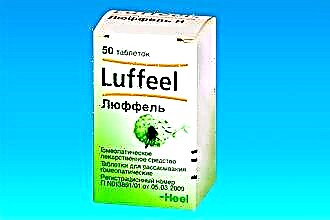The frequent occurrence of a runny nose may indicate a low level of immunity or the presence of an allergen near a person. Not always, medications are able to completely relieve the symptoms of the disease, the more their prolonged use is often prohibited. In this regard, folk remedies and homeopathy come to the rescue. They have a minimal risk of adverse reactions and can be used for a long time. Homeopathy for the common cold can be prescribed in combination with medications to enhance their therapeutic effect and strengthen the immune system.
The principle of work of homeopathy is based on the ability of the active components of the drug to cause symptoms of the disease in a mild form and the ability of the body to adapt to the stimulus. In the treatment, the minimum doses of the active substance of the drug are used.
 A non-standard method of treatment was proposed at the end of the 18th century.
A non-standard method of treatment was proposed at the end of the 18th century.
The debate over the effectiveness of homeopathic remedies has been going on for over two centuries. Traditional medicine considers the effects of homeopathy on the body as a placebo. Despite this, such medicines are widely used in the treatment of many diseases, including the common cold. For the manufacture of drugs, medicinal and poisonous plants are used.
However, one should not count on a complete cure of the disease solely with the help of homeopathy. To achieve the maximum therapeutic effect, an integrated approach is required (medication and homeopathic preparations).
Homeopathy action
With the appearance of nasal congestion and rhinorrhea, the ability to distinguish smells, taste is lost, a nasal voice, headache appears, insomnia and irritability are worried. With improper therapy, the risk of developing complications associated with the spread of infection and inflammation (otitis media, sinusitis) increases.
With a cold, homeopathy has:
- antiviral effect, which allows you to eliminate the infection and, accordingly, the cause of rhinitis;
- immunostimulating effect, thanks to which the body is able to fight the disease, preventing its progression and the appearance of complications;
- anti-edema effect, due to which the nasal mucosa becomes less thick, and nasal breathing is restored;
- anti-inflammatory effect - reduces inflammation both in the nasopharynx and throughout the body.
Homeopathic remedies for rhinitis do not cause an allergic reaction, eliminate dryness, itching in the nose, reduce a runny nose and provide a nasopharyngeal passability for air.
Homeopathy is not contraindicated for pregnant women and young children.
Depending on the therapeutic goal, several forms of drugs can be used:
- for topical use (spray, nasal drops);
- tablet forms, the action of which is aimed at eliminating the common cold;
- agents with systemic action, which are prescribed in complex therapy to strengthen immunity and fight infection.
Topical preparations
Homeopathic nasal drops may be prescribed to eliminate rhinitis. They have a local therapeutic effect and are absolutely safe to use. Let's dwell on some drugs:
- Edas-131 - used for infectious and allergic rhinitis. Due to the combined composition, the drug reduces the severity of swelling of the mucous membrane, normalizes breathing through the nose, strengthens local immunity and improves the outflow of secretions. Thus, the runny nose quickly recedes, and strong immunity does not allow the infection to re-cause the disease. The drug is indicated for profuse rhinorrhea at the beginning of a cold, as well as at the stage of the appearance of thick mucus, preventing its accumulation in the paranasal sinuses. It is recommended to drip 9 drops per day into each nostril. This dosage should be divided three times. Edas-131 is contraindicated in case of individual intolerance to the components. To identify an allergy to the drug, it is recommended to start the treatment course with a minimum dose. If you experience itching, swelling or rashes, you should stop using the homeopathic remedy and drink an antihistamine (Cetrin, Suprastin);
- Delufen - a colorless liquid with herbal ingredients that provide anti-inflammatory, antiseptic, anti-allergic, anti-edema, and stimulate regeneration. After using the drug, the nasal mucosa becomes less sensitive to allergens and other external irritants (dust, dry air). As a result, the likelihood of pronounced exudation is much lower, which is also due to the regulation of the work of the glands. The antiseptic effect allows you to fight the infection that caused the rhinorrhea. Moisturizing the mucous membrane increases the local defense against microbial penetration. Long-term use of the drug is not addictive and does not require an increase in dosage to achieve a therapeutic effect. Delufen is not recommended for people with individual intolerance to the components of the drug and severe hyperthyroidism. Two injections are prescribed per day in each nostril up to four times. Usually, the duration of the therapeutic course is 7 days, but with hay fever, the treatment can last up to a month;
- another homeopathic remedy for the common cold - Euphorbium Compositum... The liquid in the bottle is colorless, odorless, and contains plant components. The drug has antiallergic, anti-inflammatory effect, and also stimulates regeneration. As a result, swelling decreases, nasal breathing improves, and the sense of smell is restored. Moisturizing the mucous membrane ensures its protection and accelerates the repair. It is especially useful to use the drug for atrophic type of rhinitis. The effect is observed already on the 4th day of treatment. Euphorbium Compositum is prescribed for infectious, allergic, atrophic, vasomotor and hypertrophic rhinitis. The medicine is carefully used for thyroid hyperfunction, because it contains iodine. Allergic reactions are manifested in the form of skin itching, rashes, edema, increased salivation and bronchospasm. The dosage per day is 1-2 injections into each nasal passage up to five times;
 Luffel - helps to cure allergic rhinitis. Thanks to the herbal composition, the medicine reduces inflammation and reduces the sensitivity of the mucous membrane to various allergens (wool, pollen, perfume, household chemicals and cosmetics). Luffel is indicated for allergic rhinitis and atopic conjunctivitis. The drug is not prescribed for individual intolerance, it is carefully used for diseases of the thyroid gland. If you experience a burning sensation in the nose, nosebleeds, or an increase in mucous discharge, you should consult a doctor. The spray is applied up to five times a day. If you use the tablet form of the drug, the tablet should be sucked under the tongue three times a day. The duration of the course can be up to a month. With an exacerbation of the disease, it is allowed to dissolve the pill every 15 minutes (8 pieces in a row). If the allergy is caused by the appearance of pollen during the flowering of plants, it is recommended to take the tablets one month before the beginning of this period.
Luffel - helps to cure allergic rhinitis. Thanks to the herbal composition, the medicine reduces inflammation and reduces the sensitivity of the mucous membrane to various allergens (wool, pollen, perfume, household chemicals and cosmetics). Luffel is indicated for allergic rhinitis and atopic conjunctivitis. The drug is not prescribed for individual intolerance, it is carefully used for diseases of the thyroid gland. If you experience a burning sensation in the nose, nosebleeds, or an increase in mucous discharge, you should consult a doctor. The spray is applied up to five times a day. If you use the tablet form of the drug, the tablet should be sucked under the tongue three times a day. The duration of the course can be up to a month. With an exacerbation of the disease, it is allowed to dissolve the pill every 15 minutes (8 pieces in a row). If the allergy is caused by the appearance of pollen during the flowering of plants, it is recommended to take the tablets one month before the beginning of this period.
Before using nasal drops, you should cleanse the nasal mucosa with a saline solution.
An addition to the treatment is a homeopathic ointment for the common cold. Medicines of this form accelerate recovery by protecting the nasal mucosa from subsequent damage.Herbal ointments include:
- Dr. Mom - used externally, has antiallergic, antiseptic and analgesic effect. It is applied to the skin of the temporal zone, wings of the nose and chin three times a day for up to seven days. It is not recommended to use it for dermatitis, purulent skin lesions, whooping cough and an increased tendency to allergies. Adverse reactions include itching, flushing of the skin, hyperexcitability and bronchospasm;
- "Asterisk" - applied externally, you should lubricate the wings of the nose, zygomatic zone and superciliary areas. When applying the ointment to the mucous membranes, a burn is possible. It is recommended to repeat the procedure three times per day throughout the week. It is forbidden to use the ointment for people prone to allergies and bronchial asthma;
- Fleming's ointment - prescribed for various forms of rhinitis. Has antimicrobial, immunomodulatory effect, and also activates microcirculation. You can apply the ointment on the skin and mucous membranes. It is recommended to lubricate the tampon with ointment and insert it into the nasal passage for 10 minutes three times a day;
- Tuya ointment is a combined remedy that is used for non-allergic rhinitis. It is indicated only for application to the skin of the paranasal sinuses and wings of the nose. Of the side reactions, itching and irritation should be distinguished.

Tablets for the common cold
Homeopathic pills for the common cold can be used to treat the common cold. They differ in composition and indications.
| Korizalia | Sinupret forte | Cinnabsin | |
|---|---|---|---|
| Action | Reduces inflammation, mucus production, sneezing, swelling and flushing of the nasal mucosa | Anti-inflammatory, anti-edematous action, reduces hypersecretion, protects the mucous membrane, ensures the outflow of mucus and restores ventilation in the paranasal sinuses | Anti-edema, relieves nasal breathing |
| Indication | ARI with rhinorrhea, sneezing, nasal congestion. Allergic rhinitis | Sinusitis | Sinusitis |
| Mode of application | It is necessary to sublingually dissolve 1 tablet every hour on the first day, then every 2 hours for another 4 days or 1 tablet three times a day. The duration of the course is 5 days. | 1 tablet is taken three times a day, without chewing, with a large volume of water. For gastritis, it is recommended to take it after meals. Course duration 1-2 weeks | 1 tablet every hour on the first day (maximum 12 tablets), then 1 tablet three times a day. The tablet should be absorbed half an hour or 40 minutes after a meal. |
| Contraindications | Intolerance to the components, fructose. | Peptic ulcer of the gastrointestinal tract, individual intolerance to the components. | Intolerance to chromium, echinacea and other members of the Asteraceae family |
Homeopathy for colds
In a complex of medicinal preparations, homeopathy for a cold can be prescribed both for local therapy and for systemic action. The medicines listed by us are prescribed for the direct treatment of the common cold.
In addition, homeopathic remedies for the common cold, recommended for ARVI, can be prescribed. These medicines include:
- Oscillococcinum;
- Aflubin;
- Influcid;
- Anaferon;
- Traumeel S;
- Lymphomyosot;
- Engystol.
Each of the drugs has a specific therapeutic effect: antiviral, immunomodulatory, detoxification, lymphatic drainage, anti-inflammatory, and anti-edema.
Homeopathic remedies can be used to treat and prevent acute respiratory infections. Thanks to the natural composition, you can take medications without fear of adverse reactions. However, despite their safety, the dosage and duration of the course is determined solely by the doctor.

 Luffel - helps to cure allergic rhinitis. Thanks to the herbal composition, the medicine reduces inflammation and reduces the sensitivity of the mucous membrane to various allergens (wool, pollen, perfume, household chemicals and cosmetics). Luffel is indicated for allergic rhinitis and atopic conjunctivitis. The drug is not prescribed for individual intolerance, it is carefully used for diseases of the thyroid gland. If you experience a burning sensation in the nose, nosebleeds, or an increase in mucous discharge, you should consult a doctor. The spray is applied up to five times a day. If you use the tablet form of the drug, the tablet should be sucked under the tongue three times a day. The duration of the course can be up to a month. With an exacerbation of the disease, it is allowed to dissolve the pill every 15 minutes (8 pieces in a row). If the allergy is caused by the appearance of pollen during the flowering of plants, it is recommended to take the tablets one month before the beginning of this period.
Luffel - helps to cure allergic rhinitis. Thanks to the herbal composition, the medicine reduces inflammation and reduces the sensitivity of the mucous membrane to various allergens (wool, pollen, perfume, household chemicals and cosmetics). Luffel is indicated for allergic rhinitis and atopic conjunctivitis. The drug is not prescribed for individual intolerance, it is carefully used for diseases of the thyroid gland. If you experience a burning sensation in the nose, nosebleeds, or an increase in mucous discharge, you should consult a doctor. The spray is applied up to five times a day. If you use the tablet form of the drug, the tablet should be sucked under the tongue three times a day. The duration of the course can be up to a month. With an exacerbation of the disease, it is allowed to dissolve the pill every 15 minutes (8 pieces in a row). If the allergy is caused by the appearance of pollen during the flowering of plants, it is recommended to take the tablets one month before the beginning of this period.

